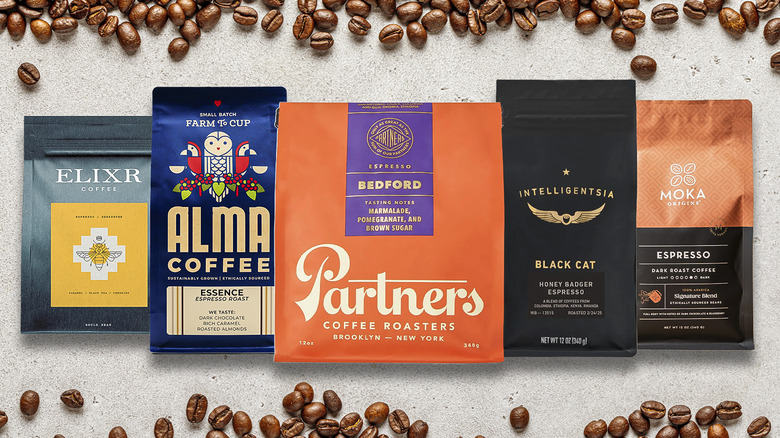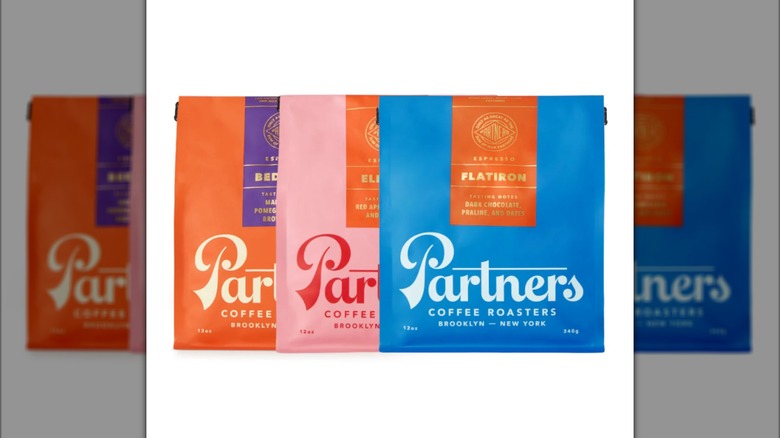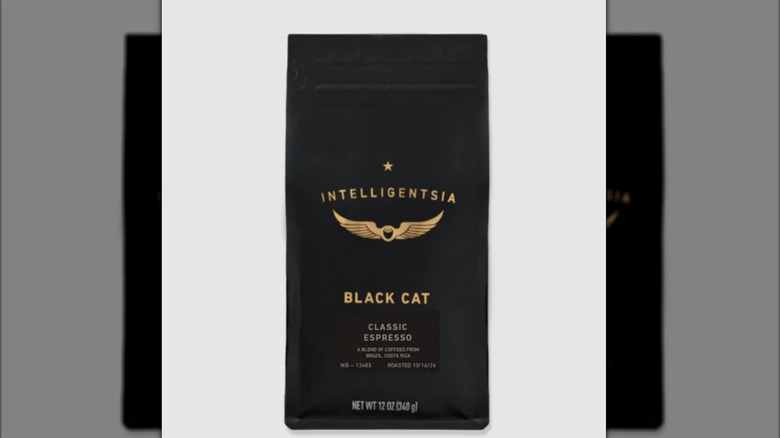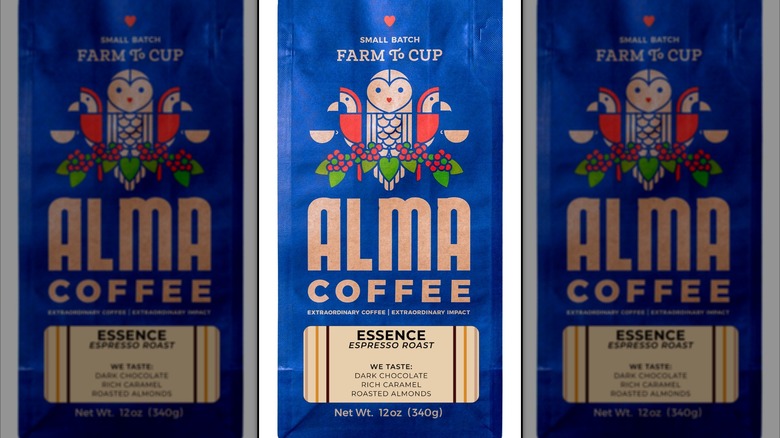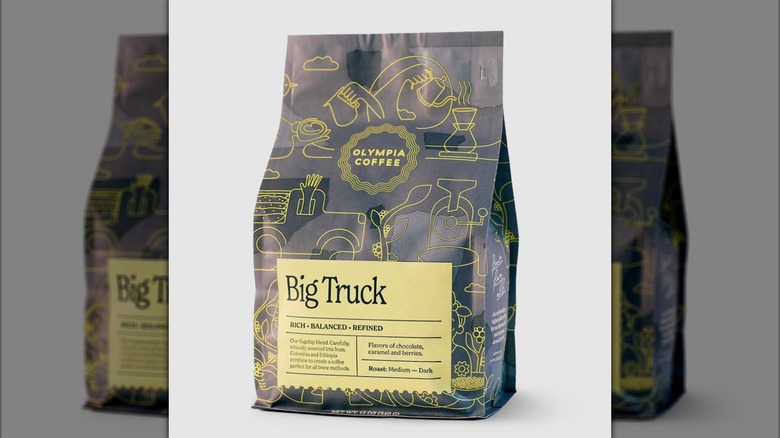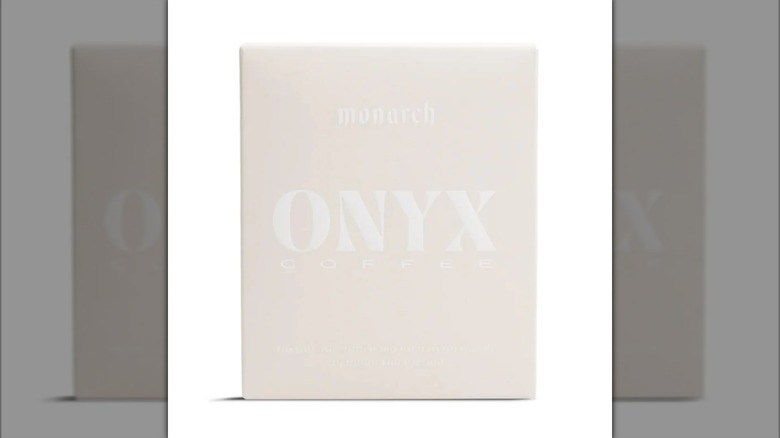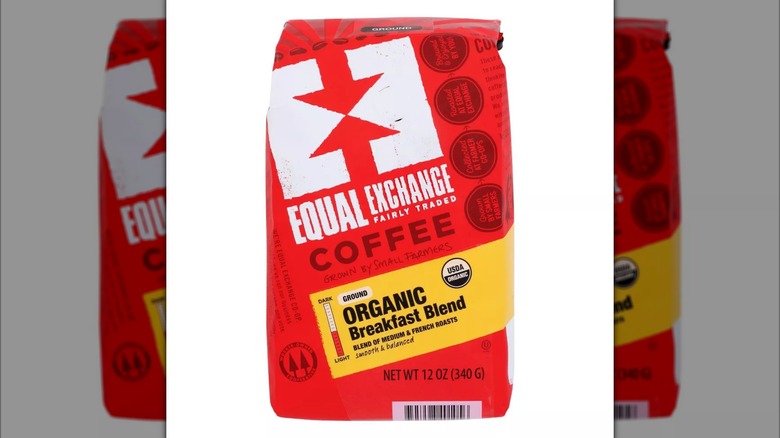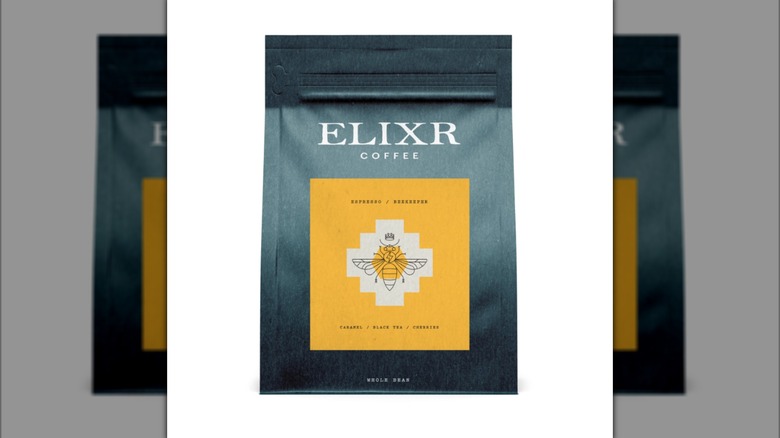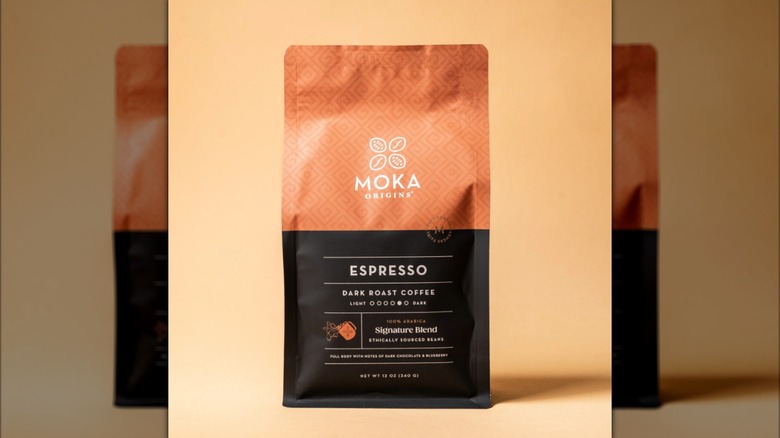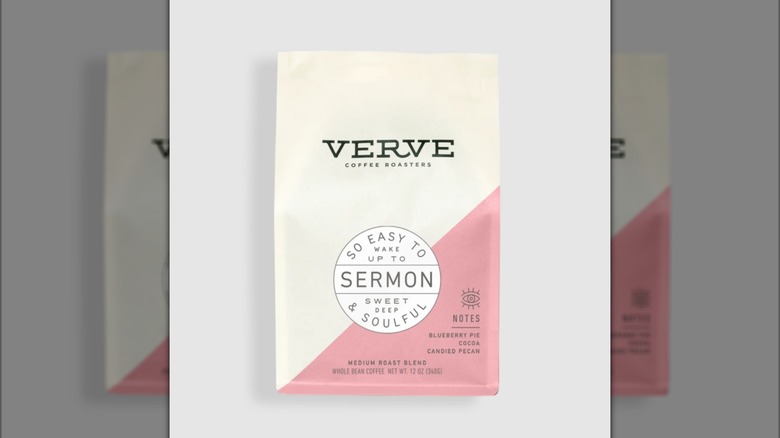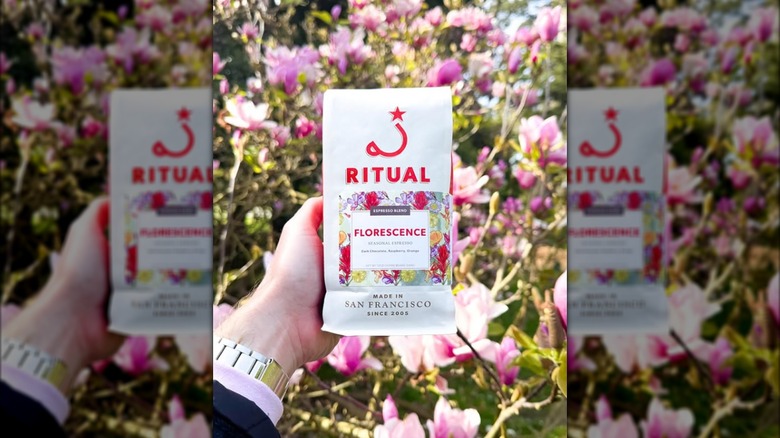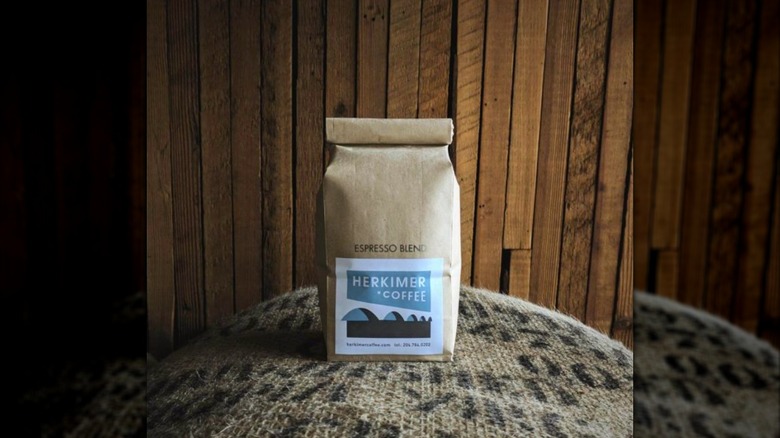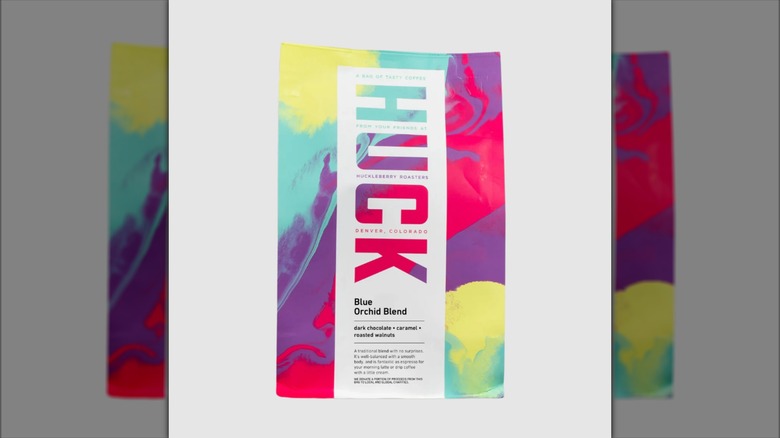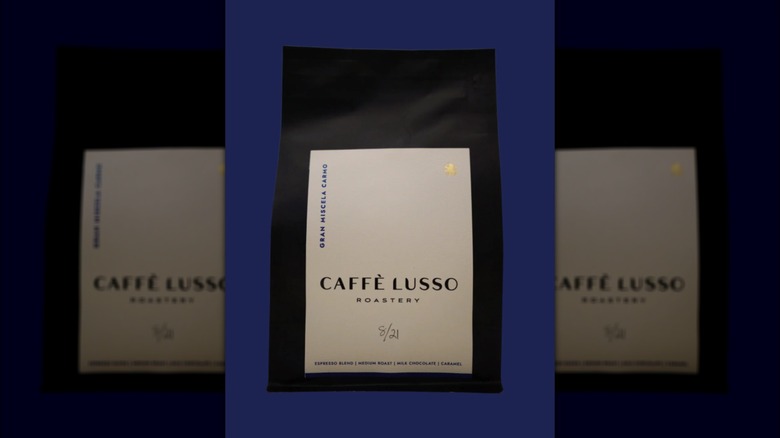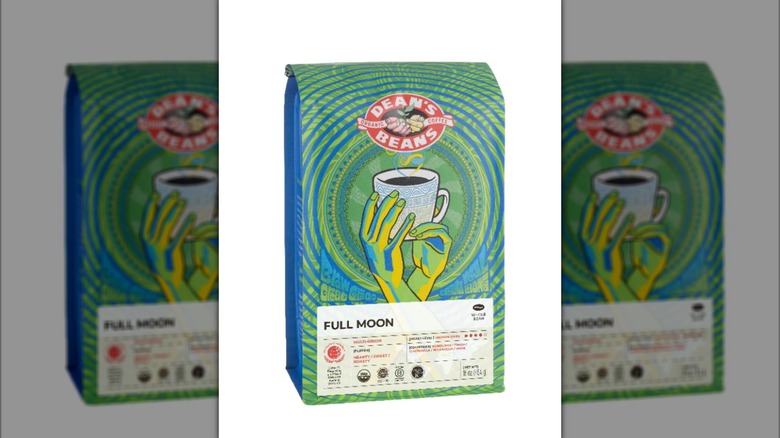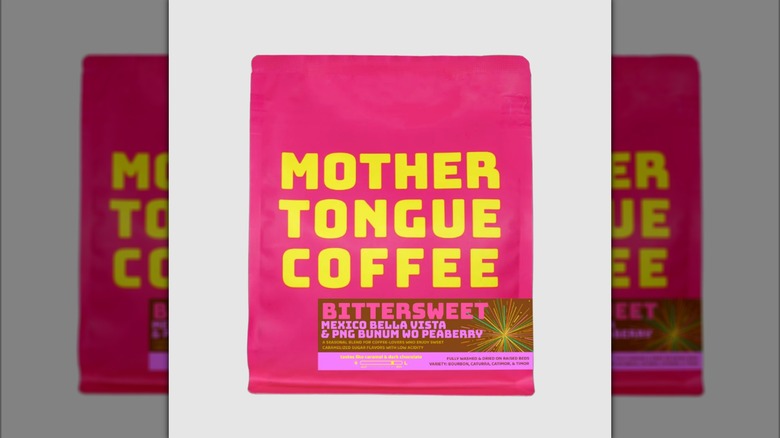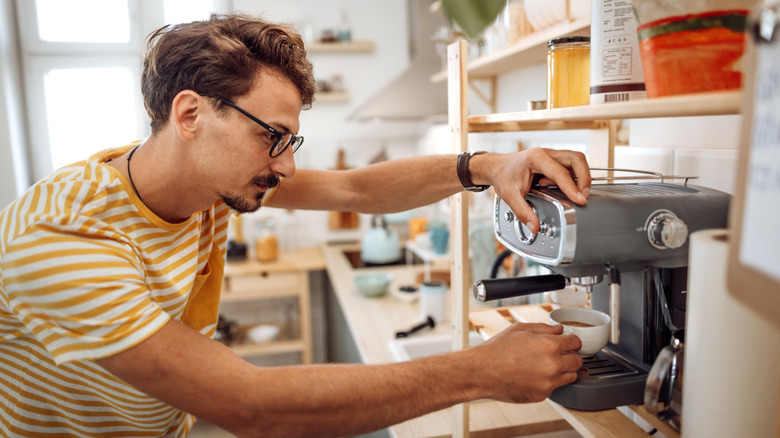15 Coffee Roasters With The Best Espresso Blends
We may receive a commission on purchases made from links.
So, you're getting ready to make the plunge and dive into the exciting, jittery world of coffee. Sure, the French press and pour over methods are somewhat fascinating, but the real magic happens when espresso comes out to play. Technically, any type of coffee beans can be made into espresso. Great espresso? Not necessarily. But thankfully, you don't have to know much about coffee to pick up a bag of beans that brews luscious, crema-heavy shots.
Many specialty coffee roasters (and even some mass-market coffee companies) offer beans that are designed for brewing espresso. These beans are usually labeled "espresso blends." As opposed to single-origin coffee, blends combine beans with differing flavor profiles, allowing roasters to nail the perfect flavor down pat. This is how you wind up with extra chocolatey coffee or particularly robust, spicy espresso.
For this list, I've tracked down some impeccable roasters that offer blends specifically for espresso or more general blends that just so happen to create an exquisite shot. As a longtime barista and certified coffee geek, I've brewed espresso with the majority of the coffees referenced in this list, while supplementing those that I haven't tried using online and word-of-mouth reviews. So, scope out this list and choose a few roasters to explore before you taint your brand new espresso machine with inadequate beans.
1. 1. Partners Coffee
Partners is the pinnacle of gourmet coffee in New York City. First launched in Brooklyn in 2012, the company has since become known for its partnerships with businesses and farmers (hence the name) and can be found far outside of New York; I even drink Partners at my local coffee shop in rural Pennsylvania. The famous roastery is home to eight mainstay coffees, which includes two blends reserved for espresso and one all-purpose brew that makes a great espresso.
Bedford, an espresso blend featuring beans from Ethiopia and Colombia, is a little different from the norm, with notes of bright fruits accentuated by toasty brown sugar. I enjoy Bedford as a latte with a little added sweetener. Flatiron, the company's flagship blend, is ideal for drip, pour over, espresso, you name it — this coffee shines in every cup with the flavor of dark chocolate and rich fruit typical of South American beans. Elevate, like Bedford, is designed specifically for espresso, making it a clear choice when you're looking for a blend to pull exceptional shots. It rotates origins on a seasonal basis, but it stays within a certain flavor range, which tends to be right smack in the middle of Bedford and Flatiron; balanced, bright, and decadent — a quintessential espresso.
2. 2. Intelligentsia
Born in the '90s in Chicago, Intelligentsia has since risen the ranks in the competitive world of specialty coffee to claim the title as one of the most sought-after coffee brands in the U.S. Intelligentisa's Black Cat espresso has a love-it-or-hate-it reputation among die-hard coffee experts, but for those new to coffee, its well-rounded taste and body makes it easy to work with, especially if your end goal is crafting milky drinks.
Black Cat espresso — a Mexican and Ethiopian blend — boasts a fruity, balanced flavor profile with a full body that's ideal for a uniquely luscious shot. Like any Ethiopian coffee, the aroma is nearly as coveted as the espresso itself, so be sure to take a deep inhale and try to discern all the coffee's specific characteristics. Notes of melon, grape, and caramel are accentuated by opulent cocoa in its taste and scent. These notes are all wrapped up in a strong, pungent package that's soothed by adding milk. This espresso fares well as a foamy cappuccino, where its intricate nuances can get a slight bump in sweetness without being covered up.
3. 3. Alma Coffee
Like many specialty coffee companies, Alma was founded on the principle that fairly traded, ethically-sourced coffee is the gold standard, and that it should be accessible to everyone. Alma — having been founded by a fifth-generation, Honduran coffee farmer — focuses on sourcing product from Honduras; a sleeper hit country for coffee. The micro-climate and elevation across Honduras varies, leaving a wide range of different beans in its wake.
Alma Coffee's staple espresso blend — elegantly dubbed Essence — is one of my all-time favorites for a quintessential espresso. Notes of cocoa, caramel, and nuts (the three staple flavor notes in a classic espresso) shine in Essence, which is rich and bold on its own, but comes to life with a little steamed milk. I wouldn't use this coffee in a latte, where excessive milk can drown out the coffee's taste. Try it as a cortado to achieve the perfect balance of smokiness and sweetness in your drink.
4. 4. Olympia Coffee
Olympia Coffee out of Washington was founded in 2005, but set up its first line of direct trade in 2009 from Costa Rica. Ever since, the company has stood out in the ridiculously oversaturated coffee market in the Pacific Northwest with its outstanding coffee. It's a favorite among coffee aficionados, and that's largely due to Big Truck, Olympia's renowned espresso blended with beans from Ethiopia and Colombia.
Whimsically named and a tried-and-true favorite, Big Truck is a great choice for a daily driver espresso. It has all the characteristics of classic espresso — chocolatey and rich with a heavy-body — but with bright notes of tart berries and a distinct spiciness that makes it unforgettable. It's roasted medium-dark to give the beans smokiness that adds complexity to its taste and aroma. Its clean finish makes it drinkable all day long as a pure, unadulterated espresso, but its spicy, tart flavor shines in a dry cappuccino.
5. 5. Onyx Coffee Lab
Few companies are as dedicated to quality and are as transparent as Arkansas-based Onyx Coffee Labs, so it's no surprise that it has a glowing reputation among coffee hobbyists. Onyx has an enigmatic, almost macabre quality in its branding that makes it a little intimidating, and its coffees are definitely geared primarily toward coffee experts. But don't let that sway you from trying its otherworldly blends that aren't designed specifically for espresso, but are best suited for it.
Southern Weather is a delicately-curated blend of Honduran, Colombian, and Ethiopian beans that create a candied nut and light, creamy flavor with a zesty, fruity finish. It's a house favorite that evokes the spirit of traditional espresso with all of the unique characteristics that make contemporary, third-wave coffee such a coveted commodity.
For a much more conventional espresso, Onyx's Monarch is the favorite blend. Monarch was designed for milky drinks, making it the preferred choice for those latte lovers among us. Its natural sweetness — which evokes dark chocolate, molasses, and red wine — creates a caramelized sugar-like effect when combined with milk.
6. 6. Equal Exchange
Anyone tuned into the world of fair trade goods is likely well aware of Equal Exchange; the company has been committed to ethics in coffee sourcing since 1986, long before it was cool. Equal Exchange operates on a business model that prioritizes worker cooperatives, solidarity with farmers and food producers, and ethical, economically sound production. Although the company produces more than just coffee, its coffee is what put it on the map.
Equal Exchange's organic espresso blend is a fan favorite that works just as well for extracting espresso as it does for brewing dark-roasted slow coffee. Its bright, fruity notes and effervescent acidity make it more tart than a traditional espresso. With added chocolate and milk in a mocha, the acidity is subdued and the fruit notes create layers of decadent flavors. Equal Exchange also offers a Black Silk espresso blend; a more complex organic coffee for experimental coffee lovers. This brew has notes of pomegranate, berries, and dark cocoa in a deep, smoky roast. Try your hand at a homemade mocha using either blend and the company's delicious, fair trade chocolate.
7. 7. Elixr Coffee Roasters
What I appreciate most about Elixr is its elegant sophistication; a trait that frequently goes hand-in-hand with specialty coffee. But despite its artisanal air, its products — down to its microlots and unique single origins — are still approachable for even the most novice home barista. This rings particularly true for Elixr's Beekeeper espresso blend.
The Beekeeper blend carries notes of caramel, black tea, and cherry, and — as is common with high-end coffee — is roasted much lighter than mass-market espressos. Beekeeper is balanced enough to act as a sipping espresso or a robust americano, but I much prefer it with a touch of milk; go for a traditional macchiato with this roast.
If you prefer creamy drinks with bold natural sweetness, give Elizr's Lunar Lander espresso blend a try. This coffee is sourced from Ethiopia, Peru, and Colombia. When enjoyed black, you'll likely taste citrus, cinnamon, and anise, but make a creamy latte or level it up with a touch of half-and-half to get this coffee to shine, no sugar required.
8. 8. Moka Origins
I'm lucky enough to call Moka Origins my neighbor, but I'm not being biased when I say that its coffee is out of this world. The Pennsylvania-based micro-roaster is known for producing both fair trade chocolate and coffee from its smallholder farms in Cameroon. Almost every coffee-slinging business in the town it calls home proudly brews Moka Origins, making it a local linchpin.
Moka Origins boasts more single-origins than it does blends, but every blend that it offers, including Mt. Pocono and its signature house blend, brews delicious espresso. But if you're perusing the roaster's catalog for your next bag of beans, you have to go with Moka Origins' espresso blend (for obvious reasons). The blend is crafted from single-origin beans specifically for espresso, with rich notes of dark chocolate and blueberry and a hint of earthiness. Moka Origins informed me that beans from Uganda and Ethiopia make up the espresso blend; keeping with their focus on highlighting African coffees. A shot brewed with this dark-roasted coffee forms luscious crema and is smooth enough to sip, or with a touch of sweet blueberry flavor in a latte or cortado, its natural fruity taste is enhanced.
9. 9. Verve Coffee Roasters
Verve is one of the biggest names in American craft coffee, and for good reason. The company's coffee catalog is extensive, with seasonal specialties, gourmet single-origins, expertly-curated blends, and even artisanal instant coffees. The California-based company rose to prominence in 2024, when Roast Magazine named Verve Macro-Roaster of the Year.
There are quite a few blends by Verve that make excellent espresso, but my personal go-to (and the favorite of many coffee hobbyists and baristas) is Sermon, named for its soulful essence. Sermon's beans are sourced from Colombia and East Africa, with fruity notes highlighted by the rich dessert flavors typical of both regions, when roasted on the darker side. The balanced coffee has a slightly syrupy body that works well with its berry notes to create an espresso that leans traditional but with an unorthodox blueberry and candied nut element. You can even find Sermon in instant coffee form; double or triple up on the coffee in the coffee-to-water ratio to create an espresso-like instant coffee for iced drinks.
10. 10. Ritual Coffee
Ritual Coffee is a big name in the fair trade coffee scene. It sources coffee from smallholder farms, paying up to triple the price that fair trade coffee normally goes for to ensure adequate living conditions for farmers and coffee producers. All coffees from Ritual are single-origins outside of its tried-and-true espresso blend, which rotates seasonally. The current selection at the time of writing is Florescence — a word that refers to the process of flowering — so, perfect for spring. Florescence is a mix of beans from Peru, Brazil, and Honduras with notes of orange, plum, and mocha that make a jammy, sweet espresso.
Past seasonal espressos by Ritual have included Headliner (a Mexican, Guatemalan, and Costa Rican blend), Awards Season (a Colombian, Honduran, and Brazilian blend), and Hidden Gem (a Guatemalan, Ethiopian, and Peruvian blend). Exploring new blends on a rotating basis is a great way to get familiar with espresso — except when your favorite vanishes; then you regret falling in love with such an ephemeral coffee.
11. 11. Herkimer Coffee
Herkimer Coffee is a small roastery in the unofficial coffee capital of America — Seattle. The folks at Herkimer source green coffee from sustainable farms that focus on old-fashioned, simple cultivation practices in order to keep the land where beans are grown as close to nature as possible. The company offers only three blends, but these three blends suit just about every standard coffee need; they consist of a drip, decaf, and espresso blend.
Those who enjoy lively acidity and complexity in their brew will appreciate Herkimer's espresso blend. This full-bodied, medium-roast coffee has notes of winey black cherry, tart Meyer lemon, and succulent strawberry accentuated by graham cracker and tamarind with a spicy tobacco and white pepper finish — a wild palette of flavors, to say the least. The beans are sourced from Central and South America and Africa, so it's no wonder this espresso is packed with an array of flavors that make it lively, complex, and a fan favorite.
12. 12. Huckleberry Roasters
Huckleberry Roasters, colloquially known as Huck, is a champion in the flourishing coffee scene of Denver, Colorado. Huck is determined to foster an ever-growing sense of community with its coffee, and its efforts are not in vain. It won Roast Magazine's 2022 Macro-Roaster of the Year award and has since become a shining star in the world of specialty coffee all over the country.
Huckleberry Roasters' Blue Orchid blend is famous among espresso enthusiasts. This is the coffee that Huck serves at all of its Denver-area cafés for espresso-based drinks. Folks that love their latte from Huckleberry can pick up a bag of whole beans to brew at home and savor the caramelized sugar and cocoa notes that are indicative of a quality traditional espresso. The beans in the Blue Orchid blend rotate seasonally, but they always maintain a consistent flavor profile that is classic and approachable.
13. 13. Caffè Lusso
If you're looking for coffee that exudes class, look no further than Caffè Lusso. The roastery has been around since 2000, fostering direct-trade relationships and combining coffee with the philosophy of patience and mindfulness. Although newbies to the coffee world might be intimidated by the brand's expert sophistication, that's no reason to shy away from its timeless blends.
You'll find two espresso blends in Caffè Lusso's catalog, one with salty, cranberry notes that's designed for sipping — the Lionshare blend — and another that acts as an unorthodox take on a classic espresso. The latter is the star of the show. The Gran Miscela Carmo blend is adored by home baristas for its caramelly, nutty taste. It utilizes three different beans, all from the same region: the Carmo de Minas region of Southeast Brazil. It includes elusive, divisive peaberry coffee as its base with the other two single-origins adding complexity to the espresso. Try it with milk, but not before sipping a standalone shot to savor its intricate nuance and rich, velvety crema.
14. 14. Dean's Beans
Dean's Beans has been one of my major go-to coffee roasters for over a decade. The Massachusetts-based company's devotion to the farmers that supply its beans and its worker-owned, cooperative business model are particularly appealing to me, but its delicious coffees are the cherry on top.
Dean's Beans offers only one blend designed for espresso — an Italian roast. But this strictly-high-grown and robusta blend isn't your only option for espresso from Dean's. Although all its medium-dark blends make worthwhile espresso, there's something particularly appealing about the Full Moon blend. Full Moon combines Timor and Honduran beans with a touch of Dean's Italian roast. The inclusion of robusta adds body to the coffee and the perfect amount of crema in every shot.
For an extra-smooth, creamy espresso, ignore the label and grab a bag of cold brew beans from Dean's. This mellow, well-rounded coffee is ideal for lattes and cappuccinos and blends seamlessly with flavor shots (I recommend something fresh and homemade). Or, for a potent, smoky-sweet espresso with a forceful name to match, opt for a bag of Rattlesnake Gutter Brew.
15. 15. Mother Tongue
Mother Tongue Coffee was founded on fair coffee-producing and selling ethics in Oakland, California, in 2019. It pays above fair value for coffee from farmers that it fosters a mutually-beneficial relationship with; a tell-tale sign of a company that roasts exceptional coffee. Bittersweet — one of Mother Tongue's most popular coffees — is a chocolate-heavy, sweet coffee blended from Bunum Wo peaberry and beans from Chiapas, Mexico, where coffee is grown by a cooperative of women farmers. It's an artisanal take on a timeless, approachable roast with all the sweet, toasty flavors that are ideal for espresso.
Despite its name, Bittersweet is incredibly mellow with low acidity, making it easy to sip straight up all day long, but its sugary caramel and intense chocolate notes means it harmonizes best with milky drinks. It's delicious as a French press, cold brew, or drip coffee, too, but as espresso, its depth of flavor and sweetness really shine, especially in lattes and cappuccinos.
16. Methodology
I chose these roasters with the best blends for espresso-based on the range of coffees they offer, or in some cases, based on one specific outstanding blend. My focus was on beans that are well-suited for beginners in coffee brewing, prioritizing traditional espresso over more experimental flavors. Some of these coffees are espresso blends, while others are more versatile, but happen to make superb espresso.
I'm a former barista with over a decade of experience in the coffee world. Throughout my time in cafés and brewing at home, I've made most of the coffees referenced in this list as espresso. Some I've brewed using other methods and could still tell they'd make a great espresso. For the few coffees I haven't personally tried, I relied on insights from online forums and reviews to help select the roasters for this list.
